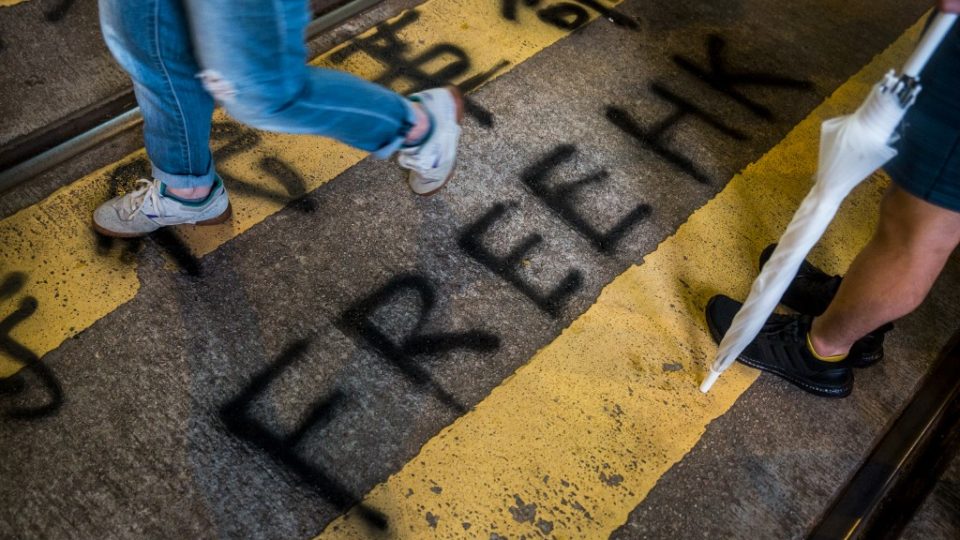Pro-democracy protesters hope to ramp up pressure on Hong Kong’s embattled pro-Beijing leaders by launching a city-wide strike today in a bid to show there is still broad public support for their movement despite weeks of chaos.
A widespread strike would be a rare accomplishment in the freewheeling finance hub where unions traditionally have little sway.
But the movement is experimenting with more varied civil disobedience techniques after huge rallies failed to move Beijing.
The semi-autonomous southern Chinese city has witnessed two months of unprecedented protests and clashes triggered by opposition to a planned extradition law that quickly evolved into a wider movement for democratic reform and a halt to sliding freedoms.
So many people waiting to check-in for @cathaypacific flights – a lot of queing @SCMPNews
Cathay Dragon counters looks relatively light.
Hong Kong Airlines is sparse.
Pics in order of airline referenced. pic.twitter.com/gSZBVfBA82
— Danny Lee (@AirEVthingTRNSP) August 4, 2019
But authorities in Hong Kong and Beijing have signaled a hardening stance with the Chinese military saying it is ready to quell the “intolerable” unrest if requested, and dozens of protesters charged with rioting.
Over the weekend riot police fired tear gas at protesters on Saturday and Sunday night.
The largely leaderless protest movement uses social messaging apps to coordinate and the strike action appears to be gaining more traction than previous strike calls in the last few weeks.
At a press conference on Saturday, strike organizers — many hiding their identities behind masks — said some 14,000 people from more than 20 sectors had already committed to civic action.
People from all walks of life have indicated plans online to either strike or phone in sick on Monday — from civil servants and social workers, to flight attendants, pilots, bus drivers and even employees of the city’s Disneyland.
There are also renewed calls to disrupt the city’s famously efficient subway system during rush hour on Monday morning.
Activists hatched a similar plan last week that led to a couple of hours of traffic jams and backlogs, but they have had little success in bringing the city to a standstill.
– ‘Psychological barrier’ –
Given its reputation as a bastion for free-market capitalism, Hong Kong does not have much recent history of successful labour movements.
“There’s a psychological barrier for people to strike,” protester and pastor Monica Wong, 40, told AFP on Sunday as she attended a large rally.
“I really understand how some people will face huge pressures from their supervisors,” she added.
In a statement late Sunday, Hong Kong’s government warned people against joining the strike, saying it could further hamper the city’s already sputtering economy.
“Any large-scale strikes and acts of violence will affect the livelihood and economic activities of Hong Kong citizens,” it said.
Alongside the strike, protesters plan to hold rallies in seven different parts of the city, the fourth day in a row that protests have been scheduled.
The last fortnight has seen a surge in violence on both sides with police repeatedly firing rubber bullets and tear gas to disperse increasingly hostile projectile-throwing crowds.
A group of men suspected to be linked to triads — Hong Kong’s notorious gangsters — also attacked demonstrators, putting 45 people in hospital.
Under the terms of the 1997 handover deal with Britain, Hong Kong has rights and liberties unseen on the Chinese mainland, including an independent judiciary and freedom of speech.
But many say those rights are being curtailed, citing the disappearance into mainland custody of dissident booksellers, the disqualification of prominent politicians and the jailing of pro-democracy protest leaders.
Public anger has been compounded by rising inequality and the perception that the city’s distinct language and culture are being threatened by ever-closer integration with the Chinese mainland.
Hong Kong chief executive Carrie Lam has made few concessions beyond agreeing to suspend the extradition bill, and has shied away from public appearances.
Protesters are demanding her resignation, an independent inquiry into police tactics, an amnesty for those arrested, a permanent withdrawal of the bill, and the right to elect their leaders.




